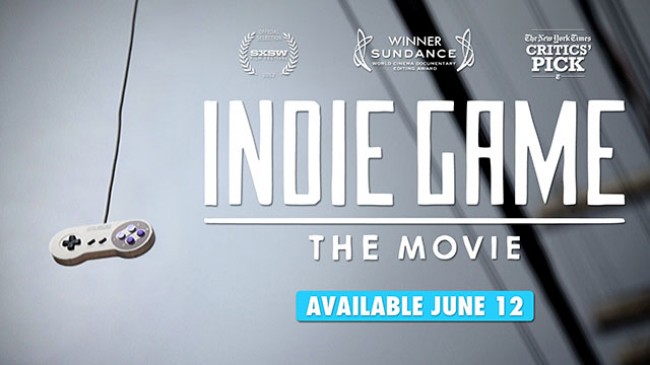Four young scientists, accompanied by Eskom Expo’s Business Manager, Mmamoloko Rancia Riba, won their place to represent the country at the Indonesia competition, renowned…
Reviewed — Indie Game: The Movie

This Kickstarter-funded documentary reveals insights into the niche industry of indie game development. More than that though, it shows the self-doubt, risk-taking and anxiety that artists feel when working on deeply personal projects.
Indie Game: The Movie could easily be dismissed as style over substance. Its digital camera techniques are currently in vogue and its full of festival hype. But even though it’s not the most subtle film, it shows us the faces behind the pixels and its revelations about the creative process goes beyond the gaming industry and makes for compelling viewing. But perhaps its greatest feat is appealing to non-gamers.
The film follows the development of the indie game Super Meat Boy, with designer Edmund McMillen and programmer Tommy Refenes, and Fez, along with its designer Phil Fish. There are a few segments which focus on the wildly successful game Braid and its developer, Jonathan Blow, yet these are used more informatively and historically than emotively, like the other two stories.
The film kicks off with Jonathan Blow giving insights into the gaming industry. He highlights how main studio titles set out to achieve the most polished possible product with the end goal to reach the widest audience and ultimately earn a bucket load of money.
He emphasises that independent developers have different kinds of goals and, subsequently, different pressures. They do not have to please publishers or even wide audiences for that matter and so make games for more personal reasons. For him, making games is a way to communicate with people.
A common theme in the movie is that games, operating as a form of expression are, in essence, an extension of the artist creating it. It sounds cheesy but anyone who has ever worked on a personal project for several years can relate to this. When one project becomes your reason to get up in the morning it becomes your meaning.
The documentary cleverly focuses on the ups and downs of giving one task so much meaning. The extreme elation of success versus the persistent feeling that failure is just around the corner is skilfully captured through the surprisingly moving 90 minutes of film.
Delving into the childhood influences of Team Meat’s Tommy and Edmund, Tommy reiterates that he doesn’t make games for other people, but for himself. The last two years he has self-imposed social isolation, put himself in dire financial standing and struggles with health problems, specifically diabetes. His is a story of huge sacrifice.
Edmund on the other hand, easily the most personable in the film, reveals a challenging childhood while being a creative outsider and explains how his relationship with his wife has taken strain since developing Super Meat Boy. For Edmund, not unlike Jonathan Blow, making games is about communicating and interacting with people. Seeing him watch people play Super Meat Boy on Youtube is a strangely touching 21st century moment.
Phil Fish, the infamous creator of Fez, almost takes centre stage in the latter half of the movie. Fez’s development is plagued with legal battles, disintegrating personal relationships and funding problems. Fish’s egotistical and narcissistic tendencies are frustrating at first, almost unbearable to watch, but ironically reveal his deepest flaws by the end of the film. Despite a flare for the dramatic, Fish’s obsession with what people think about him is echoed in the themes of Fez. Behind a game in which the world has fallen apart and you need to put it back together, is a man who is not in control of his own world, and desperately wishes that he was.
A testament must be made to filmmakers Lisanne Pajot and James Swirsky who could easily have made these characters heroes of the indie game world. Instead we get to see a very personal story of artists struggling within their own medium. It is a bit dramatic at times and its heavily stylised aesthetics border on being too slick. Yet it is masterfully edited, wonderfully shot and has a killer soundtrack.
Indie Game: The Movie is not just about games, it’s about the desire to be heard, to communicate and be recognised within an art form. And that is something any creative can relate to. If it does nothing else, Indie Game: The Movie shows the personal stakes and the risks people take to get something made that they deeply care about. It highlights the sacrifices people make, and while it’s at it, it humanizes the gaming industry. This is very much a 21st century film dealing with 21st century ideas and problems. So go on and access it like you only can in 2012 – digitally – through its website, Steam or iTunes.
Price: US$9.99



